Wearable manpower-saving devices developed by NSYSU available on market soon
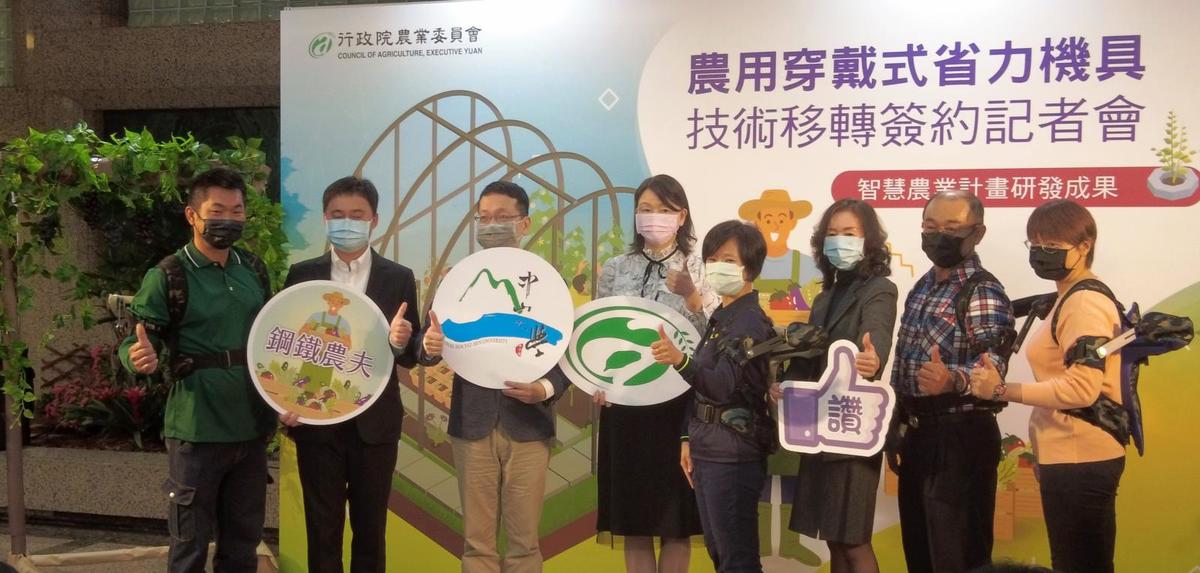
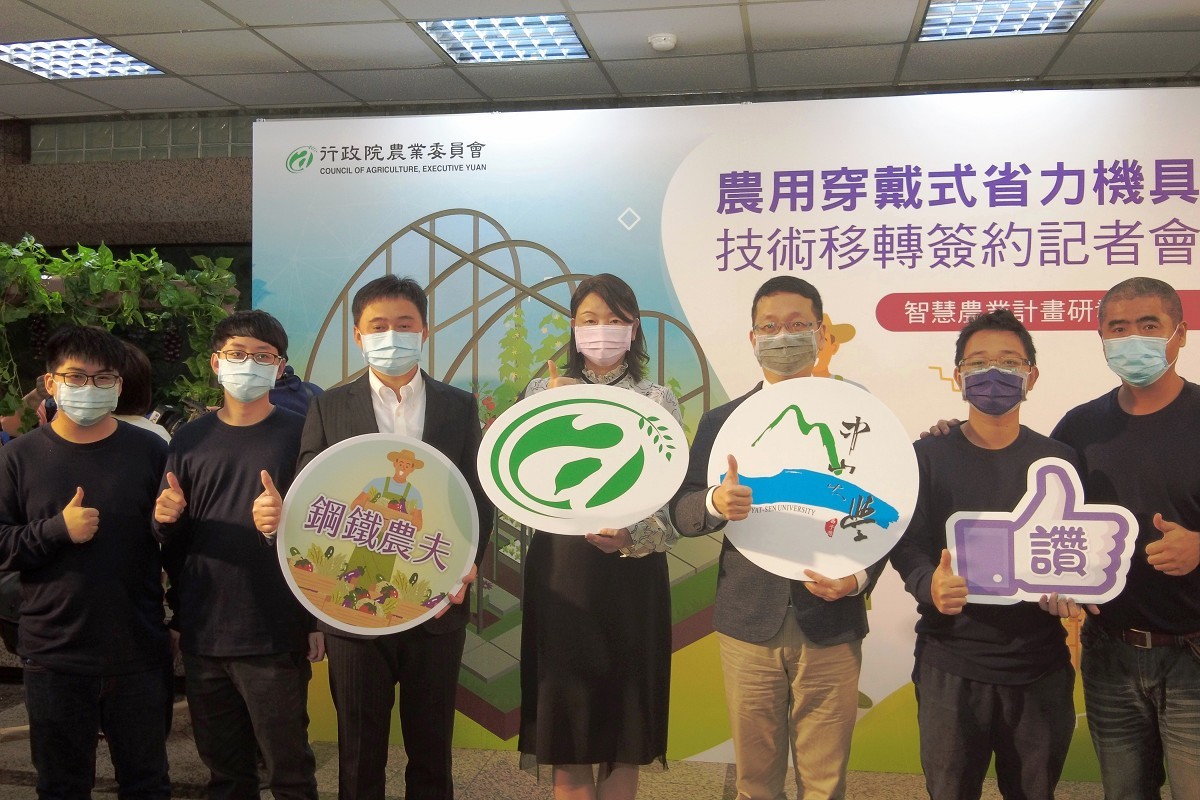
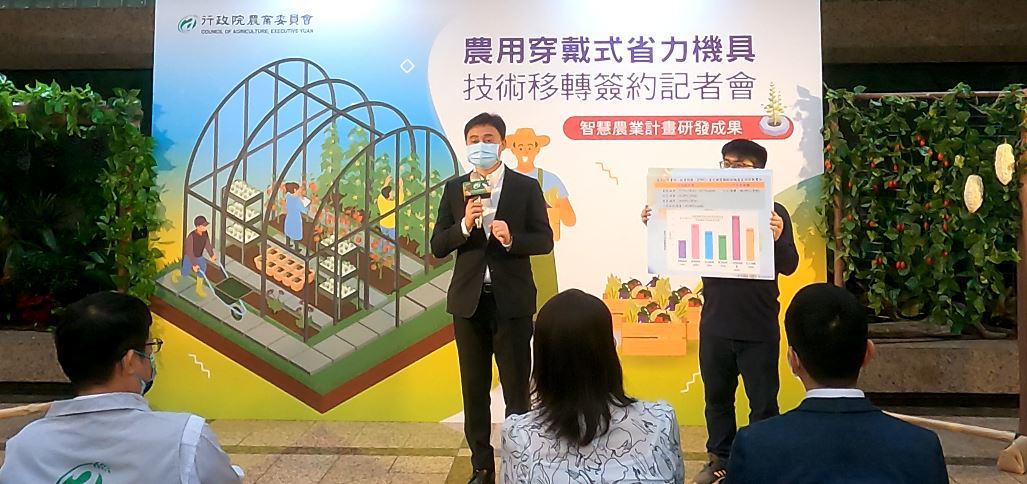
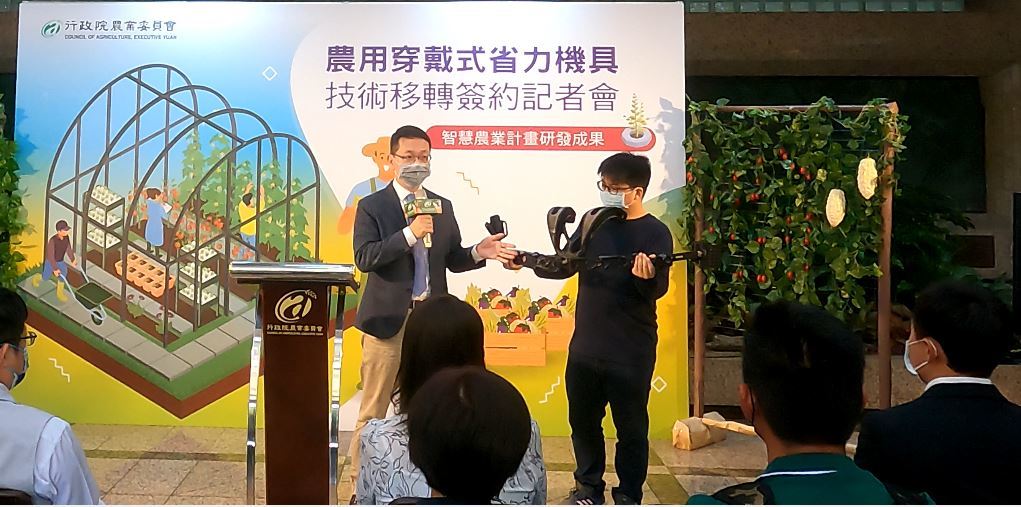
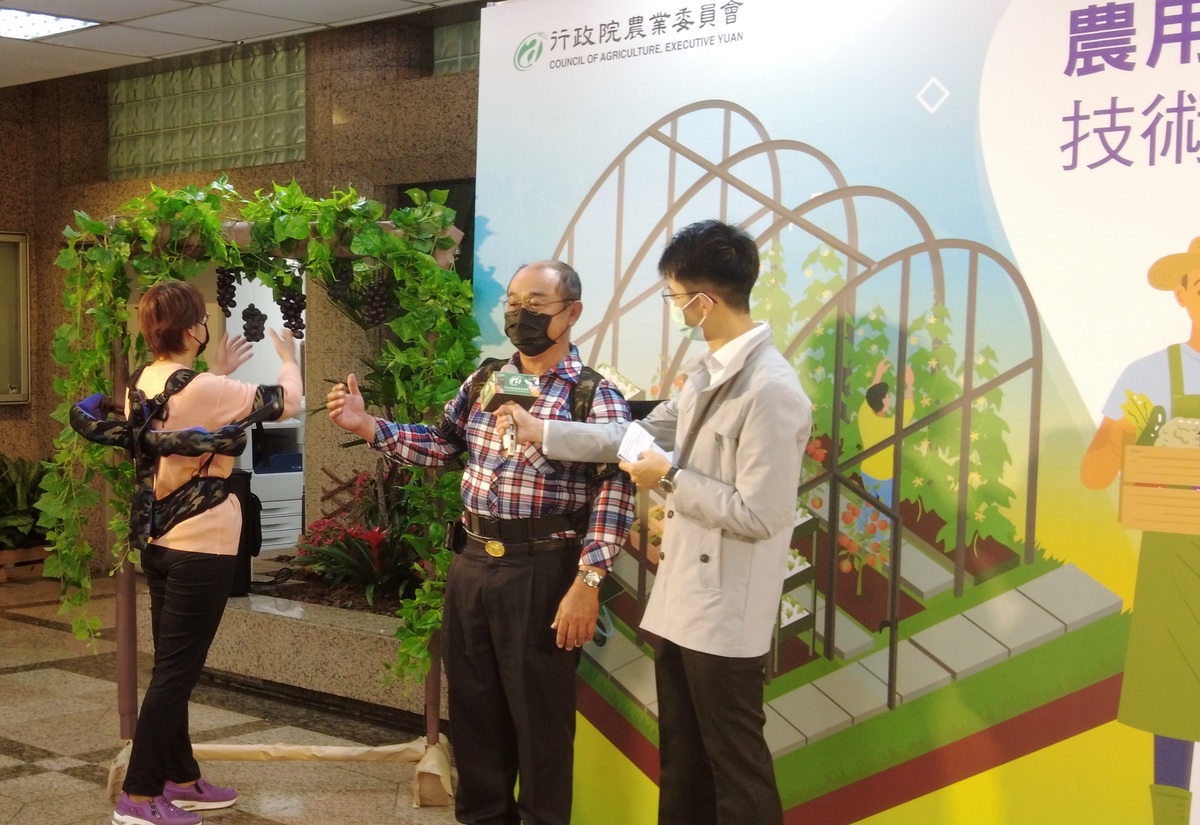
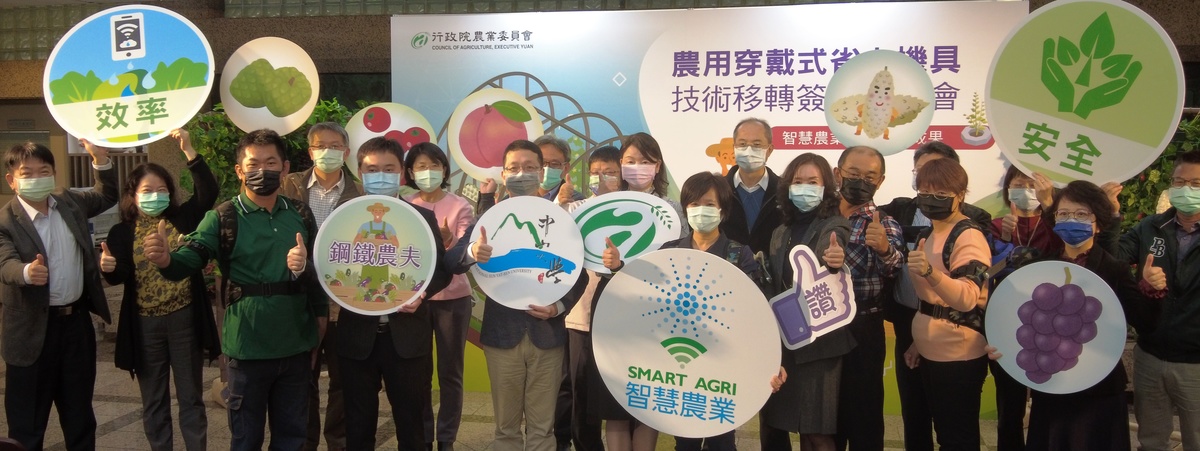
2021-02-19
(Provided by Office of Research and Development) The Council of Agriculture has recently organized a press conference on technology transfer by NSYSU’s Bionic Technology Research Team. Associate Professor Wei-Chih Lin of the Department of Mechanical and Electro-Mechanical Engineering at NSYSU obtained the support of the Smart Agriculture Project to use the bionic technology to develop three models of wearable manpower-saving device imitating the moves of gibbons. The devices will be available on the market in the first quarter of this year. After the tests were conducted by farmers, the devices were improved: their weight does not surpass 2 kg and they can save 50-60% of muscle power. The Chief Secretary of the Council of Agriculture Mei-Ling Fan said that she hopes wearable manpower-saving devices will be incorporated into the agricultural devices’ subsidy program in the future.
NSYSU follows global research trends. A few years ago, the University established the Bionic Technology Research Team, spreading across relevant departments and institutes of the colleges of Science, Engineering, and Marine Sciences. The Team has achieved excellent research results. After returning to Taiwan from the University of Cambridge, Associate Professor Wei-Chih Lin has demonstrated outstanding performance working at TSMC and the College of Engineering. The wearable manpower-saving devices, developed with the funds of the Council of Agriculture, is a successful example of bionic machinery R&D. Professor Lin designed and produced wearable powerless manpower-saving devices to imitate the movements of gibbons and the connection between the bones, tendons, and muscles, and help farmers in their work by reducing the force of arms needed, and thus reducing the fatigue and pain caused by repeated lifting of the arms and the occurrence of occupational injuries. The result of his research is four patents in Taiwan: wearable upper arm assistive device, adjustable exoskeleton suit, adjustable manpower-saving device, and wearable lower limbs assistive device. Professor Lin is also applying for patents overseas.
Senior Vice President of NSYSU Mitch Chou pointed out that the research and development of bionic technology have been experiencing fast growth worldwide in recent years. As the name suggests, "bionic” denominates something that imitates natural organisms, including their structures, behaviors, organ functions, physical and chemical processes inside and outside the body, energy supply and transmission. The analysis of their structure from the principles of science and technology can be the starting point for the design and production of completely new technologies. Bionic technology has a wide range of applications, such as in biology, material science, engineering, medicine, machinery, and agriculture. The number of devices that apply bionic technology is increasing. Top universities in Europe and the United States are successively establishing courses related to bionic science, and the Council of Agriculture has introduced bionic technology to the development of AI agriculture devices, which is a visionary action that can bring new opportunities. Senior Vice President Chou thanked the Council for Agriculture for its years-long support for bionic engineering research at NSYSU and said that the University would provide subsidies to Professor Lin's two long-term projects, concerning AI manpower-saving devices and the R&D for water lily planting and harvesting and noted that the close cooperation of the academia and research will make a valuable contribution to Taiwan's agriculture.
“We hope that in the future, the wearable manpower-saving devices will be incorporated into the agricultural devices subsidy program.” The Chief Secretary of the Council of Agriculture Mei-Ling Fan said that the Council will actively promote the Smart Agriculture Project and that she is happy to see the commercialization of the research results by Professor Wei-Chih Lin of NSYSU as well as the technology transfer to a manufacturer so that in the future the farmers can buy and use it to avoid the physical burden of farming work and fatigue. This is great news for the agricultural development in Taiwan. Fan emphasized that this research project was subsidized by the Department of Farmers' Service of the Council of Agriculture and supported by five District Agricultural Research and Extension Stations (DARES) in Taiwan. Last year, 80 manpower-saving devices were made and sent to DARES for farmers to test them in nearly 50 orchards. Fan hopes that in the future, there will be more researchers in Taiwan engaging in smart agriculture research, develop more smart devices to increase the economic and work efficiency, benefit the farmers, as well as address the problems of insufficient manpower and aging community of farmers, and let the world notice the potential of agriculture in Taiwan.
The press conference was hosted by the Chief Secretary Mei-Ling Fan of the Council of Agriculture, representing Vice-Chairperson Junne-Jih Chen. In the conference participated: Senior Vice President of NSYSU Mitch Chou, Head of the Department of Science and Technology of the Council of Agriculture Dennis Wang, Deputy Head of the Department of Farmers’ Service of the Council of Agriculture Yi-Ren Chen, Deputy Head of the Agriculture and Food Agency Chih-Wang Yao, Deputy Head of Taiwan Agricultural Research Institute Tzu-Rong Tsai, as well as the Heads of the DARES in Taoyuan, Taichung, Tainan, Kaohsiung, and Taitung, many farmers, and traders of agricultural machinery to celebrate the introduction of technology in everyday agricultural work.
(Edited by Public Affairs Division)
(Provided by Office of Research and Development) The Council of Agriculture has recently organized a press conference on technology transfer by NSYSU’s Bionic Technology Research Team. Associate Professor Wei-Chih Lin of the Department of Mechanical and Electro-Mechanical Engineering at NSYSU obtained the support of the Smart Agriculture Project to use the bionic technology to develop three models of wearable manpower-saving device imitating the moves of gibbons. The devices will be available on the market in the first quarter of this year. After the tests were conducted by farmers, the devices were improved: their weight does not surpass 2 kg and they can save 50-60% of muscle power. The Chief Secretary of the Council of Agriculture Mei-Ling Fan said that she hopes wearable manpower-saving devices will be incorporated into the agricultural devices’ subsidy program in the future.
NSYSU follows global research trends. A few years ago, the University established the Bionic Technology Research Team, spreading across relevant departments and institutes of the colleges of Science, Engineering, and Marine Sciences. The Team has achieved excellent research results. After returning to Taiwan from the University of Cambridge, Associate Professor Wei-Chih Lin has demonstrated outstanding performance working at TSMC and the College of Engineering. The wearable manpower-saving devices, developed with the funds of the Council of Agriculture, is a successful example of bionic machinery R&D. Professor Lin designed and produced wearable powerless manpower-saving devices to imitate the movements of gibbons and the connection between the bones, tendons, and muscles, and help farmers in their work by reducing the force of arms needed, and thus reducing the fatigue and pain caused by repeated lifting of the arms and the occurrence of occupational injuries. The result of his research is four patents in Taiwan: wearable upper arm assistive device, adjustable exoskeleton suit, adjustable manpower-saving device, and wearable lower limbs assistive device. Professor Lin is also applying for patents overseas.
Senior Vice President of NSYSU Mitch Chou pointed out that the research and development of bionic technology have been experiencing fast growth worldwide in recent years. As the name suggests, "bionic” denominates something that imitates natural organisms, including their structures, behaviors, organ functions, physical and chemical processes inside and outside the body, energy supply and transmission. The analysis of their structure from the principles of science and technology can be the starting point for the design and production of completely new technologies. Bionic technology has a wide range of applications, such as in biology, material science, engineering, medicine, machinery, and agriculture. The number of devices that apply bionic technology is increasing. Top universities in Europe and the United States are successively establishing courses related to bionic science, and the Council of Agriculture has introduced bionic technology to the development of AI agriculture devices, which is a visionary action that can bring new opportunities. Senior Vice President Chou thanked the Council for Agriculture for its years-long support for bionic engineering research at NSYSU and said that the University would provide subsidies to Professor Lin's two long-term projects, concerning AI manpower-saving devices and the R&D for water lily planting and harvesting and noted that the close cooperation of the academia and research will make a valuable contribution to Taiwan's agriculture.
“We hope that in the future, the wearable manpower-saving devices will be incorporated into the agricultural devices subsidy program.” The Chief Secretary of the Council of Agriculture Mei-Ling Fan said that the Council will actively promote the Smart Agriculture Project and that she is happy to see the commercialization of the research results by Professor Wei-Chih Lin of NSYSU as well as the technology transfer to a manufacturer so that in the future the farmers can buy and use it to avoid the physical burden of farming work and fatigue. This is great news for the agricultural development in Taiwan. Fan emphasized that this research project was subsidized by the Department of Farmers' Service of the Council of Agriculture and supported by five District Agricultural Research and Extension Stations (DARES) in Taiwan. Last year, 80 manpower-saving devices were made and sent to DARES for farmers to test them in nearly 50 orchards. Fan hopes that in the future, there will be more researchers in Taiwan engaging in smart agriculture research, develop more smart devices to increase the economic and work efficiency, benefit the farmers, as well as address the problems of insufficient manpower and aging community of farmers, and let the world notice the potential of agriculture in Taiwan.
The press conference was hosted by the Chief Secretary Mei-Ling Fan of the Council of Agriculture, representing Vice-Chairperson Junne-Jih Chen. In the conference participated: Senior Vice President of NSYSU Mitch Chou, Head of the Department of Science and Technology of the Council of Agriculture Dennis Wang, Deputy Head of the Department of Farmers’ Service of the Council of Agriculture Yi-Ren Chen, Deputy Head of the Agriculture and Food Agency Chih-Wang Yao, Deputy Head of Taiwan Agricultural Research Institute Tzu-Rong Tsai, as well as the Heads of the DARES in Taoyuan, Taichung, Tainan, Kaohsiung, and Taitung, many farmers, and traders of agricultural machinery to celebrate the introduction of technology in everyday agricultural work.
(Edited by Public Affairs Division)
Click Num:
Share
